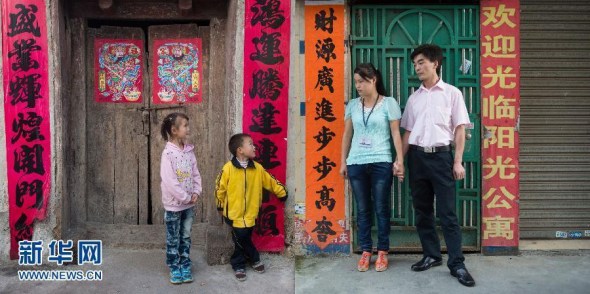
This combo photo shows left-behind children stand in front of an old-style wooden gate in their hometown while their parents in front of an apartment building in a big city. (Xinhua/Liu Jie)
(ECNS) - Migrant workers are the great contributors to China's massive urbanization and rapid development, but as rural dwellers of working age leave home to earn money in cities, many of them leave their children behind.
According to the China Family Development Report 2015, released by the National Health and Family Planning Commission in May, one out of three rural children has been left behind by parents working in cities. The number of left-behind children is over 61 million, according to 2014 statistics, and from 2005 to 2010, the number increased by 4.13 percent. That equates to 2.42 million newly added left-behind children.
In traditional Chinese families, where different generations live together, young adults are the pillar of a household, being breadwinners as well as caring for the old and the young. But the new socio-economic situation means many rural young adults are shouldering just one of the two responsibilities. The new norm in rural areas is for seniors to do farm work and care for grandchildren, while the parents may see their children only once a year, or even once every few years.
Children growing up in this kind of incomplete family are more prone to behavioral and psychological problems. The lack of parental care and guidance, along with the backward educational philosophies of grandparents, are cited as the major causes.
A survey on migration workforces conducted this year in Henan, Anhui, Hunan, Jiangxi, Chongqing and Guizhou shows that 49.2 percent of left-behind children have been injured in accidents, 43.8 percent are not interested in their studies, 49.9% often do not complete homework tasks, and 39.8 percent feel lonely.
China's current residency policy, the Hukou system, as well as its education system, make it difficult for rural children to follow their parents to cities.
Over the years, many parties have tried to alleviate the problem. Social organizations have initiated public services, volunteers have devoted time and energy, and central and regional governments have released new policies. Nevertheless, China still lacks a comprehensive and over-arching plan targeting the education and management of rural left-behind children.
"Nothing can replace a parent's companionship and educational input in children's growth. The ultimate solution for left-behind children is system change," said Xia Xueluan, a professor at Peking University's Department of Sociology. He suggested further reform of the residency system, and is pushing for equal opportunities in terms of public services, so that migrant workers and their children can both enjoy the welfare offered by cities.
"The migration from the countryside to cities should not be only the migration of a workforce. Our policies should help them migrate in a more complete sense, such as the migration of families," said Duan Chengrong, a professor at Renmin University of China.
















































